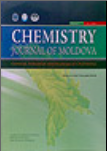Chemistry Journal of Moldova
2009 Volume 4, no.1
Author(s):
Field: Physical chemistry and chemical physics
Type: Research paper
Issue: 2009 Volume 4, no.1
Pages: 123-128
N. N. Gorinchoy, B. Dobrova, M. Yu. Gorbachev, G. Munteanu, and I. Ya. Ogurtsov
Field: Physical chemistry and chemical physics
Type: Research paper
Issue: 2009 Volume 4, no.1
Pages: 123-128
Full Text (PDF): Download
DOI: dx.doi.org/10.19261/cjm.2009.04(1).01
Graphical Abstract: The present work is devoted to the theoretical study of the activation of the acetylene molecule coordinated in the [Pt(PPh3)2C2H2] complex. By means of DFT calculations it is shown that the geometrical and electronic characteristics of the C2H2 are essentially changed due to its coordination. The subsequent detailed analysis of the molecular orbitals (MO) of the active valence zone of this complex allows one to make important conclusion that this activation is being realized mainly due to the orbital back donation of 5d-electronic density from one of the occupied MOs of the complex [Pt(PPh3)2] to the unoccupied antibonding π*-MO of C2H2.
Downloads: 34
Author(s):
Field: Physical chemistry and chemical physics
Type: Research paper
Issue: 2009 Volume 4, no.1
Pages: 118-122
Alexandru Cecal, Tudor Lupascu, Oana Roxana Hauta, Ioana Gorodea, Mircea Palamaru, Alexandra Raluca Iordan , Ada Macovei
Field: Physical chemistry and chemical physics
Type: Research paper
Issue: 2009 Volume 4, no.1
Pages: 118-122
Full Text (PDF): Download
DOI: dx.doi.org/10.19261/cjm.2009.04(1).02
Graphical Abstract: This paper deals with a study of water splitting by gamma rays in the presence of some double perovskites A2MM’O6 and also Sr2Fe1-xTa1+xO6. The irradiation is performed using 60Co as a source with 3·104 Ci activity and 8.3 kGy/h dose rate, which simulated the radioactive wastes, resulted from reprocessing of spent nuclear fuel elements much more active: 108-109 Ci. The stable products of radiolysis, as well as the other chemical species are measured by mass spectrometry. The calculated radiation yield (GH2) generally decreases in the order: Sr2Fe1-xTa1+xO6 (x=0.5; 0.4; 0.3; 0.1) > Ca2AlTaO6 > Sr2AlTaO6 > Ba2AlTaO6, under the given experimental conditions; the yield was higher in the presence of these catalysts than in their absence.
Downloads: 21
Author(s):
Field: Physical chemistry and chemical physics
Type: Research paper
Issue: 2009 Volume 4, no.1
Pages: 111-117
O. I. Gona, N. V. Stolyarchuk, Yu. L. Zub, and N. A. Yaroshenko
Field: Physical chemistry and chemical physics
Type: Research paper
Issue: 2009 Volume 4, no.1
Pages: 111-117
Full Text (PDF): Download
DOI: dx.doi.org/10.19261/cjm.2009.04(1).03
Graphical Abstract: Mesoporous silicas with the thiourea functional group ≡Si(CH2)3NHC(S)NHC2H5 have been synthesized by monotemplate and bitemplate route (bitemplate is cetylpyridinium chloride as micelle-forming surfactant and monoethanolamide of saturated n-aliphatic acid as non-micelle-forming surfactant). The infl uence of a number of factors on mesoporous silicas structure has been studied: alkoxysilanes and surfactants concentration, and as well as the nature of medium in hydrothermal treatment of mesophases. The optimum conditions under which functionalized mesoporous silicas have possessing highly ordered hexagonal structure have been found. The surface area of mesoporous silicas synthesized using optimum bitemplate solubilization composition reaches 1055-1350 m2/g and sorption volume and pore diameter are 0.75-0.95 cm3/g and 2.5-2.9 nm respectively.
Downloads: 11
Author(s):
Field: Physical chemistry and chemical physics
Type: Research paper
Issue: 2009 Volume 4, no.1
Pages: 103-110
Moisey I. Belinsky
Field: Physical chemistry and chemical physics
Type: Research paper
Issue: 2009 Volume 4, no.1
Pages: 103-110
Full Text (PDF): Download
DOI: dx.doi.org/10.19261/cjm.2009.04(1).04
Graphical Abstract: The inelastic neutron scattering (INS) and EPR transitions are considered for the spin-frustrated V3 and Cu3 nanomagnets. It is shown that the DM exchange and distortions determine the Q-dependence and redistribution of the intensities of the intra- and inter-doublet INS transitions in the 2(S=1/2) states as well as the intensities of the EPR transitions. The peculiarities of the INS and EPR spectra of the V3 ring of V15 quantum molecular magnet and EPR spectra of the V3 and Cu3 nanomagnets are described by the isosceles Heisenberg model with the DM exchange. Spin chirality and spin structure of the Cu3 and V3 nanomagnets with the Dzialoshinsky-Moriya (DM) exchange interaction are analysed in the vector and scalar spin chirality models. The vector chirality model describes the field, orientation and deformation dependence of the spin chirality κn. The spin chirality is formed by the DM interaction and depends on the sign of the DM parameter Gz. The DM exchange and distortions determine the degree of chirality κn<1 in the isosceles clusters.
Downloads: 8
Author(s):
Field: Organic chemistry
Type: Research paper
Issue: 2009 Volume 4, no.1
Pages: 97-102
Loredana Vacareanu (Stafie), Virgil Barboiu, Daniel Timpu, Mircea Grigoras
Field: Organic chemistry
Type: Research paper
Issue: 2009 Volume 4, no.1
Pages: 97-102
Full Text (PDF): Download
DOI: dx.doi.org/10.19261/cjm.2009.04(1).05
Graphical Abstract: A Schiff base macrocycle with persistent rhomboidal shape was synthesized in excellent yield through [2+2] condensation reaction between (R,R)-1,2-diaminocyclohexane and 4,4’-diformyltriphenylamine. The dimeric macrocylic structure was proved by electrospray ionization mass spectrometry (ESI-MS), 1H-NMR, and FTIR spectroscopy. The complexation properties were evidenced by UV absorption.
Downloads: 25
Author(s):
Field: Inorganic and coordination chemistry
Type: Research paper
Issue: 2009 Volume 4, no.1
Pages: 90-96
Hideaki Ishida, Makoto Handa, Ichiro Hiromitsu, and Masahiro Mikuriya
Field: Inorganic and coordination chemistry
Type: Research paper
Issue: 2009 Volume 4, no.1
Pages: 90-96
Full Text (PDF): Download
DOI: dx.doi.org/10.19261/cjm.2009.04(1).06
Graphical Abstract: A chloro-bridged chain complex constructed from paddlewheel-type dinuclear ruthenium(II,III) carboxylate units, [Ru2{3,4,5-(C2H5O)3C6H2CO2}4Cl]n·1.2nC2H5OH (1·1.2nC2H5OH), was synthesized and characterized by elemental analysis and IR and UV-vis spectroscopies. The single-crystal X-ray analysis showed that the complex forms a zig-zag chain structure, in which the chloroligands bridge the dinuclear units at the axial positions with the Ru1–Cl–Ru2 angle of 120.38(7)°. A broad band around 1144 nm and a band at 475 nm were observed in the diffused reflectance spectra and ascribed to a δ→δ* and a π(RuO, Ru2)→π*(Ru2) transitions, respectively. Temperature dependence of magnetic susceptibility showed that the antiferromagnetic interaction between the dinuclear units is weak (zJ = −0.8 cm−1) with D value of 60 cm−1.
Downloads: 30
Author(s):
Field: Food chemistry
Type: Research paper
Issue: 2009 Volume 4, no.1
Pages: 84-89
E.N. Kornilova, N.I.Kornilov, O.N Vasiltseva
Field: Food chemistry
Type: Research paper
Issue: 2009 Volume 4, no.1
Pages: 84-89
Full Text (PDF): Download
DOI: dx.doi.org/10.19261/cjm.2009.04(1).07
Graphical Abstract: Mineral waters of Russia, the CIS countries (Ukraine, Belarus, Moldova, Armenia, Azerbaijan, Georgia and Uzbekistan) and EU (Germany, France, Italy, Spain and some East European countries) carried to Chloride-Hydrocarbonate type have been investigated in this work. The analytical dependences connecting, entered by authors, characteristic parameters of structure of waters (В, Ф, R) with independent variables of ionic structure and concentration are resulted.
Downloads: 16
Author(s):
Field: Ecological chemistry
Type: Research paper
Issue: 2009 Volume 4, no.1
Pages: 79-83
Goncharuk Vladyslav
Field: Ecological chemistry
Type: Research paper
Issue: 2009 Volume 4, no.1
Pages: 79-83
Full Text (PDF): Download
DOI: dx.doi.org/10.19261/cjm.2009.04(1).08
Graphical Abstract: The reasons of poor quality of the drinking water, submitted to consumers have been analyzed. The new concept of supplying the population with high quality drinking water is offered. Qualitative and safe for health drinking water is produced on site of its consumption (using the installations for well-room type). The ways for solving of legislative, organization and technical problems required for realization of the proposed concept are considered.
Downloads: 12
Author(s):
Field: Ecological chemistry
Type: Research paper
Issue: 2009 Volume 4, no.1
Pages: 75-78
Vasile Rusu and Aliona Vrinceanu
Field: Ecological chemistry
Type: Research paper
Issue: 2009 Volume 4, no.1
Pages: 75-78
Full Text (PDF): Download
DOI: dx.doi.org/10.19261/cjm.2009.04(1).09
Graphical Abstract: Studies of the sorption capacity towards Cu2+ ions of diatomite from the Ghidirim location of RM, as well as of the extracted clay phase are presented. Separated clay fraction from diatomic material is clean enough, and especially is rich in montmorillonite. Maximum sorption capacity for studied clay fraction is achieved by rising the temperature of calcination treatment up to 200oC. At higher temperatures the lattice of montmorillonite is contracted and its sorption capacity towards Cu2+ ions decreases strongly.
Downloads: 24
Author(s):
Field: Ecological chemistry
Type: Research paper
Issue: 2009 Volume 4, no.1
Pages: 72-74
V.M. Mukhin, Yu. Ya. Spiridonov, T.G. Lupascu
Field: Ecological chemistry
Type: Research paper
Issue: 2009 Volume 4, no.1
Pages: 72-74
Full Text (PDF): Download
DOI: dx.doi.org/10.19261/cjm.2009.04(1).10
Graphical Abstract: The paper emphasizes a very severe social-ecological problem, related to the contamination of soils by pesticides and fodder micotoxins. The authors suggest the utilization of a carbon adsorption based method of purification of soils contaminated with traces of pesticides. It is demonstrated that this method of soil rehabilitation leads to an 80% crop increase, allowing the production of environmentally clean plant products. The utilization of special activated carbons “Ptitsesorb” leads to a 30-40% decrease of necessary combined fodder in chickens breeding.
Downloads: 36






